


Baseball Toaster was unplugged on February 4, 2009.
BEFORE THE LAW stands a doorkeeper. To this doorkeeper there comes a man from the country and prays for admittance to the Law. But the doorkeeper says that he cannot grant admittance at the moment. The man thinks it over and then asks if he will be allowed in later. "It is possible," says the doorkeeper, "but not at the moment." Since the gate stands open, as usual, and the doorkeeper steps to one side, the man stoops to peer through the gateway into the interior. Observing that, the doorkeeper laughs and says: "If you are so drawn to it, 'just try to go in despite my veto. But take note: I am powerful. And I am only the least of the doorkeepers. From hall to hall there is one doorkeeper after another, each more powerful than the last. The third doorkeeper is already so terrible that even I cannot bear to look at him." These are difficulties the man from the country has not expected; the Law, he thinks, should surely be accessible at all times and to everyone, but as he now takes a closer look at the doorkeeper in his fur coat, with his big sharp nose and long, thin, black Tartar beard, he decides that it is better to wait until he gets permission to enter. The doorkeeper gives him a stool and lets him sit down at one side of the door. There he sits for days and years. He makes many attempts to be admitted, and wearies the doorkeeper by his importunity. The doorkeeper frequently has little interviews with him, asking him questions about his home and many other things, but the questions are put indifferently, as great lords put them, and always finish with the statement that he cannot be let in yet. The man, who has furnished himself with many things for his journey, sacrifices all he has, however valuable, to bribe the doorkeeper. The doorkeeper accepts everything, but always with the remark: "I am only taking it to keep you from thinking you have omitted anything." During these many years the man fixes his attention almost continuously on the doorkeeper. He forgets the other doorkeepers, and this first one seems to him the sole obstacle preventing access to the Law. He curses his bad luck, in his early years boldly and loudly; later, as he grows old, he only grumbles to himself. He becomes childish, and since in his yearlong contemplation of the doorkeeper he has come to know even the fleas in his fur collar, he begs the flea ' s as well to help him and to change the doorkeeper's mind. At length his eyesight begins to fail, and he does not know whether the world is really darker or whether his eyes are only deceiving him. Yet in his darkness he is now aware of a radiance that streams inextinguishably from the gateway of the Law. Now he has not very long to live. Before he dies, all his experiences in these long years gather themselves in his head to one point, a question he has not yet asked the doorkeeper. He waves him nearer, since he can no longer raise his stiffening body. The doorkeeper has to bend low toward him, for the difference in height between them has altered much to the man's disadvantage. "What do you want to know now?" asks the doorkeeper; "you are insatiable." "Everyone strives to reach the Law," says the man, "so how does it happen that for all these many years no one but myself has ever begged for admittance?" The doorkeeper recognizes that the man has reached his end, and, to let his failing senses catch the words, roars in his ear: "No one else could ever be admitted here, since this gate was made only for you. I am now going to shut it."-Frank "Sandy" Kafka's Before the Law
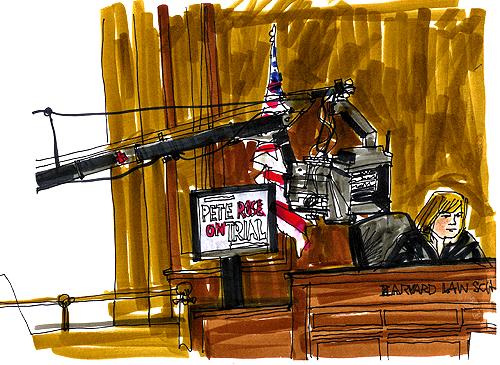
I may have been the only person this side of Doug Llewelyn to take ESPN's "Pete Rose on Trial" a couple of weeks ago seriously (well, and that sketch artist). It may be because I conducted my own trial of hustling Mr. Charles Hustle peopled by fictional characters. I do have to say that my "trial" delved further into the facts then ESPN's version. The again, I employed more credible attorneys- Jimmy Stewart from Anatomy of a Murder, Perry Mason, Joe Pesci in My Cousin Vinny, etc.-than Johnny Cochran and Alan Dershowitz. (Actually, Cochran was on my defense team as well and said of the betting slips, "If the note isn't great, you must exculpate".) And judge was Ray Walston, who at least had a baseball connection via Damn Yankees, as opposed to ESPN's choice of Catherine Crier, who as a judge, the best thing I can say about her is that, to quote Rodney Dangerfield, she "must have been something before electricity."
Anyway, below are my notes from the trial of the All-Century for what it's worth:

Dershowitz (prosecution): Regarding Rule 21 d, he claims that "anyone who violates the rule will be declared permanently ineligible." This is just not true. If you bet on your own team, part of 21d, only then may you be declared permanently ineligible.
Here's the rule in question:
(d) BETTING ON BALL GAMES. Any player, umpire, or club official or employee, who shall bet any sum whatsoever upon any baseball game in connection with which the bettor has no duty to perform shall be declared ineligible for one year.Any player, umpire, or club or league official or employee, who shall bet any sum whatsoever upon any baseball game in connection with which the bettor has a duty to perform shall be declared permanently ineligible.
- Regarding the Dowd Report: "The only question you will have is whether his extraordinary talents as a ballplayer, his extraordinary records, requires [sic] that baseball bend, break, this sacrosanct rule. I will argue to you that baseball should not break that rule. Certainly not unless and until Pete Rose acknowledges his mistake and admits that he bet on baseball and asks for the apology that he has not asked for until now."
I have no idea what that "asks for the apology..." is about. Apology from whom? Long-dead Bart Giamatti for reneging on his deal? Fay Vincent for perpetuating this mess? Bud Selig for ignoring this issue and yet lifting Rose's ban so that MLB can cash in on his name for the All-Century merchandizing? [Or Dershowitz himself for appallingly attacking the sacrosanct Bill James on the stand?]
What is this need for an apology about? If you believe that Rose bet on the Reds, the apology should not change your mind about his banning. If you don't believe that the evidence proves that he bet on the Reds, then an apology is superfluous. Actually an apology in that case would be the best piece of evidence that he should be banned.
I guess if I were Rose, whatever he did or did not do, I would apologize for gambling on the game, an offense that carries a one-year ban, which he has more than served. However, I would never admit or apologize for betting on the Reds, because that would demand his permanent suspension. No one, including the lawyers here, seem to get that distinction.
- Deshowitz evokes Shoeless Joe Jackson saying, "nobody doubts he is qualified for the Hall of Fame". Well, I do.
For one thing, he only played nine full seasons and parts of four others since he was drummed out at the age of 30. His stats are extremely impressive-.356 batting average and an OPS 70% better than the park-adjusted league average-but in a deadball era he only collected 1772 hits. Had Jackson been hit by a bus after the 1920 season instead of being banned for life, would he be in the Hall of Fame? Probably, but he would not be the lock that everyone assumes him to be. There are non-Hall of Famers form Jackson's era who have not become a cause celebre because of their throwing a World Series but may be better candidates, e.g. George van Haltren. Still Jackson's 170 adjusted OPS is ranked seventh (tied) all-time.
However, I ask you to consider Dave Orr. Orr is slightly behind Jackson in career adjusted OPS (161, 14th all-time). He played until the age of 30 in the 1890 season and had a .342 career batting average. He is technically not eligible for the Hall because he only played eight total seasons, but his 7 full seasons are not far behind Jackson's nine in quality. Orr's career wasn't ended by a bus but rather a paralyzing stroke. So why don't you hear a great outcry about the injustice of Orr not being in the Hall and of the unfair rule that bars his admittance? Because his career was too short and he has been largely forgotten. Frankly, had Jackson not played for the "Black Sox" but had a career that ended at 30, so too would he be largely forgotten, an asterisk in the statistical record. The one reason why he can never go in the Hall is the reason so many have been calling for his inclusion in Cooperstown.

Cochran (defense): "Baseball has not done the right thing. This case is really about baseball justice."
This point does resonant with a good number of fans. They accept that Rose bet on his team, but the Power That Be in baseball, i.e., the commissioner, screwed him, so he should get off. It's the Joe Jackson-ites' weltanschauung re. Jackson and White Sox owner Charles Comiskey. I think that baseball has screwed Rose but that it's a separate issue from his innocence or guilt in the gambling issue.
Cochran than lists his records and feats via a poster-sized index card. It looked like a cue card. Rose's stats are nice but are irrelevant to his guilt or innocence in the matter.
Cochran displays a Giamatti letter to a judge for bookie Ron Peters saying that Peters has been honest and forthright before the investigation was completed. Cochran says that basically this shows that the case was a frame job, and he's right. Dowd was a prosecutor putting together a prosecutor's brief. That baseball bought it lock, stock, and barrel is either na´ve or duplicitous depending on your point of view.
Cochran points to the Rose-Giamatti agreement that there were no findings on whether Rose bet on baseball. It's a good point that goes very far in invalidating the prosecutor's case.
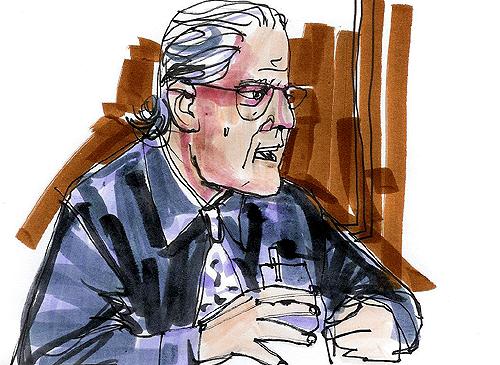
Lester Munson (SI): Munson is the Basil Exposition for the Dowd Report, which he can apparently recite at will without having discovered one of the many inconsistencies listed therein.
- He claims that the Dowd Report supports the stance that Rose bet on baseball and the Reds.
- Re. the betting slip, he states that Rose bet on baseball, it is in Rose's handwriting, and that Rose's fingerprint was on it even though the last item was not in the Dowd Report (Dowd blurted it out in his own defense later on). First, no mention is made that Dowd never saw the original betting slip. That went to the FBI, who were investigating Rose-and eventually convicted him-for income tax evasion. Dowd only saw a copy. Rose was made to copy the writing on the slip for the handwriting expert, a practice that is highly suspect since it very often yields a false match, especially with block letters. The slip has erroneous information ("Cin At Mon" and "LA At Houst" never happened on April 9, 1987).
Not to mention, the means by which this piece of evidence was acquired. Stoolie Paul Janszen admitting to taking them from Rose's home after Rose had kicked out his girlfriend, who had been living with the Rose family. Is this kosher? Shouldn't Cochran blow a hole in this?
- Re. a conspiracy to frame Rose: "If it was a conspiracy, a fantastic number of people would have to be orchestrated and some of them were personal enemies, who not only did not get along, you couldn't even have them in the same room. So there is really no possibility of a conspiracy to get Pete Rose."
What? It does not take a conspiracy, just two men, Ron Peters (the bookie) and Paul Janszen (the go-for). Their various girlfriends and hangers-on only know what they know refracting through their perspectives. Actually, Peters was only getting the bets through Janszen, so he doesn't know what Rose was really doing. It only takes Janszen. That's how Rose designed it to cover his tail whether against tax evasion charges or baseball suspensions or both-you make the call. Besides, Janszen had a personal grudge against Rose for kicking out his girlfriend, not backing Janszen with various gamblers which resulted in threats on his life, an unpaid debt that Janszen claimed varied between $10 K and $50 K (all sited without note in the Dowd report), severing ties after Janszen was found to be involved in drugs, and not meeting Janszen's demands for money in exchange for "protection" (actually in the Dowd report in Janszen's testimony presented as supporting evidence in Janszen's favor).
- Cochran does not ask Munson about any of the erroneous or conflicting evidence in the Dowd Report nor about his biased and ridiculous statements on the stand. He just alludes to the agreement.
Cochran: "It's true, is it not, that per that agreement they were not to go out and contradict what was in that agreement. Is that correct?"
Munson: "I believe there is disagreement on that, Mr. Cochran. I think that on one hand people say that they could talk about whether he bet on baseball. Pete Rose insists that part of the agreement was they could not talk about that." (What? A) Cochran did not mention betting on baseball. And B) what agreement allows for people "to go out and contradict" it? Is this man insane?)
Cochran: "Well, let me tell you what the agreement says. The agreement says that they would not do anything to contradict what's in the agreement. If the agreement does not make a finding on gambling, then wouldn't you find that would be a contradiction to go out and say, 'Hey, he bet on baseball'?"
- Re. the injunction on MLB that led to the Rose agreement, Munson calls the Cincinnati State Court ruling, the "home-court-advantage ruling for Rose."
- Re. the Hall of Fame rule change to ban ineligible players, Munson says, "Permanently ineligible means permanently ineligible. You can file all the applications you want, but permanently ineligible has a certain meaning." As a matter of fact, it doesn't. This is a blatantly ridiculous and false statement. Heinie Groh, Ferguson Jenkins, Steve Howe, Dickie Kerr, Mickey Mantle, Willie Mays, and George Steinbrenner were all declared permanently ineligible only to be reinstated later. Mays, Mantle, and Jenkins are in the Hall of Fame.
- Munson: "Pete Rose's efforts to keep all of this secret show that he too knew that he were caught gambling, especially on baseball, he would never be in the Hall."
Well, we already know that gambling on baseball doesn't get you barred from the Hall of Fame. Betting on his own team would be required.
Second, to quote Uncle Junior Soprano, at this time "Federal marshals are so far up [Rose's] ass [he] can taste Brylcreem". Rose would later be arrested on tax evasion. One of Dowd's discoveries is a trifecta won by Rose and cashed illegally under Janszen's name. Rose was a scumbag involved in criminal activity. Of course, he didn't want any of it to come out. However, not if it had anything to do, necessarily, with his baseball career.
- In summary, if this is Sports Illustrated's investigative reporter, no wonder it is such an unreadable, poorly researched rag.
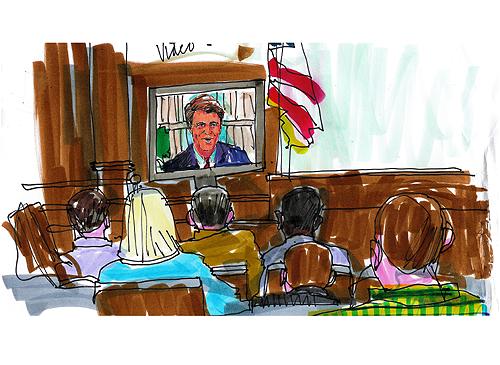
Jim Palmer:
- Re ex-commissioner Bowie Kuhn, quoted Kuhn as saying his job is largely "trying to maintain the integrity of baseball."
Boy, talk about a conservative player. How did he do those underwear ads without blushing? Did Palmer miss the memo about Kuhn trying to destroy his union? Kuhn was the man called the "village idiot" by Charlie Finley and about whom Red Smith said, "this [the 1981] strike wouldn't have happened if Bowie Kuhn were alive today"-the punch line is that Kuhn was the commissioner at the time.
- To Rose, "This is not about you and me. For you to be where you belong, you have to let us know what really happened. And be responsible for it."
Well, maybe he already has. Who are you, John Dowd? Have you examined every piece of evidence about the man to be so certain of his guilt?
- Cochran gets Palmer to admit that he has never even read the Dowd report. What is he doing on the stand? Oh, he's Jim Palmer and this is a TV show, that's what.
- Cochran introduces a line that he repeats over the course of the show/trial: Rose's performance as a player is Hall-worthy. His performance as a manager is not. So why does an infraction as a manager have an effect on his ineligibility to enter the Hall?
Well, I think the whole man goes in the Hall, not just the player part. It's not like the time on Star Trek when the split the bad Captain Kirk and the good Captain Kirk apart in the transporter and kept tested the thing with two dyed-pink poodles that had survived the same bifurcation, one comatose and one rabid. Remember the Good Kirk lost the ability to make decisions without a little bad in him. Is Cochran using Kirk's split-literally-personality as an analogue for Rose: he changed when he became a manager to include an evil side necessary for making decisions? Let's put the Good Rose in the Hall and transport the Evil Rose into deep space?
Dr. Jon Grant (compulsive gambling expert): Discusses compulsive behavior of a gambler and the desire for "winning big". The sickness strikes 3-4 % of adults and calls it a sickness similar to drug or alcohol addiction.
- Cochran gets him to admit that he never examined Rose. Another waste of time.
Steve Garvey (is not my Padre!): Sheez, does anyone else notice how white the players for the prosecution are?
- "Peter Rose had and has a problem, and that's gambling. If he looked in the camera and said, 'I made a mistake. I ask for forgiveness', he'd be in the Hall of Fame today."
This guy who openly admitted to fathering children by two different women out of wedlock is going to lecture to Rose about scruples?
- Garvey repeats the line that no one on the permanently ineligible list has ever gone in the Hall. I guess Mays, Mantle, and Ferguson aren't big enough names for people to remember that this just taint so.
- Cochran reminds Steve and his electric ego that Rose did admit that he gambled on other sports, just not baseball. Does Garvey who still stays in contact with Rose, according to his testimony, have some piece of evidence not in the Dowd Report? Otherwise why is he up on the stand? Oh, a) because he is Steve Garvey and b) because he pushes the party line of "Apologize Pete". Another waste of time.
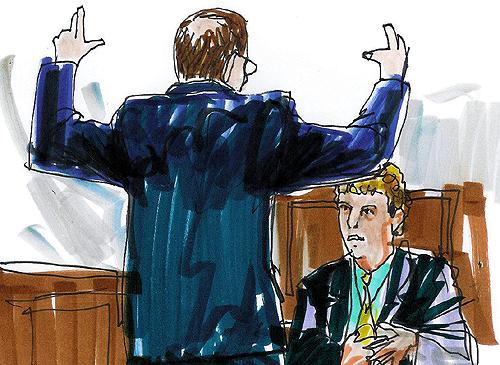
Dan Shaughnessy Boston Globe: Shaughnessy has to mention Buckner. Get that plug. What is he, Bobby Bittman on the Sammy Maudlin Show? How long is he going to milk this bit?
- Shaughnessy says Rose would "absolutely" be admitted to the Hall if he admitted to gambling. Who is he, the Amazing Kreskin? This line is rebutted well by the Parker line later on.
- He states that there have never been any Hall of Fame votes for Joe Jackson. Of course, he threw a World Series and admitted to it. It's a different infraction than Rose is even alleged to have broken. If Rose admits to it, Shaughnessy wants to put him in!?!
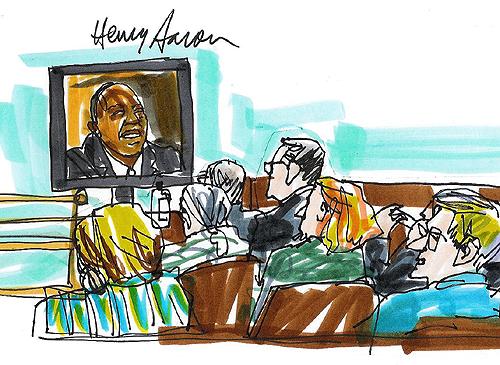
Hank Aaron: Dershowitz gets him to admit that he has no information re. the evidence against Rose and that he should admit to gambling of he did it. That's a bit of an oopsy there.
Arnie Wexler (Compulsive gambling counselor): Again the "expert" admits no direct knowledge of Rose's case. What's the point?
- Dershowitz tries to turn Wexler's history-that of a recovered compulsive gambler-against Rose. He asks if it is possible to turn one's life around without admitting a problem, and Wexler says he's not sure. It all seems somewhat damning until you realize that no one has said definitive that Rose is even a compulsive gambler.
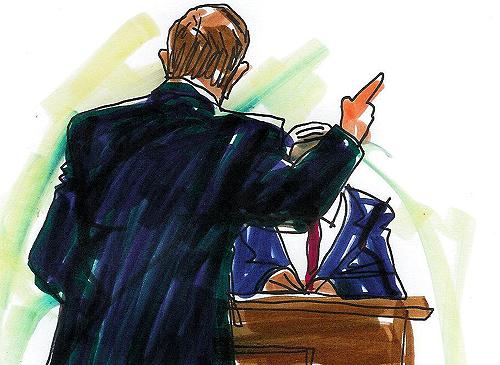
Bill James:James refers to his Hall of Fame book as The Politics of Glory and ignores the later (and I believe current) title.
- James mentions NFL Hall of Famers Paul Hornung and Alex Karas (yes, Webster's dad), who were banned for gambling on league games at one point. Though, of course, the penalty in baseball for betting on baseball games is declared to be one year anyway.
- Then he finally puts an end to this "permanently ineligible means permanently ineligible" saying that the number of Hall of Fame members who were ineligible at some point approaches fifty. That seems a bit high. Is he including suspensions for brawls and that sort of thing? Anyway, it's a valid point.
- Dershowitz hammers away at James about his statement that Danita Marcum, Paul Janszen's girlfriend, failed a lie detector test. James cites a 20/20 report. Dershowitz counters with, "Is that how you do your research?" Then he asks if James even read the Dowd report.
- James is probably the only one on the defense, including the lawyers, who read the Dowd report. His debunking of the gambling slips is not even brought up. The lie detector issue is a sidebar in James' analysis. The damn thing isn't even admissible, so who cares? The man who got Claus von Bulow off-he was portrayed by Jeremy Irons: of course he was guilty-has the gall to even speak to Bill James, let alone in this manner?
- I feel bad for James. He is visible shaken by Dershowitz's badgering-there is no other word for it. James stammers on occasion and his joke about an "ear witness" to describe the men who overhear alleged conversations with Rose falls flat. James is the only credible witness that Cochran has, and apparently Dershowitz wants to do his best to discredit him. Dershowitz is a scumbag, but I guess that's his job. It seems a bit too LA Law-ish to me, but I guess it plays in Peoria. I'm surprised he didn't bring up Boston's "bullpen by committee" to throw in James' face.

Bill Lee: Why doesn't this guy have a show on ESPN? He calls the case a "work of fiction" and says what Rose did wasn't a "capital offense".
- Really, Lee adds no substance to the defense, but the analysts think he is the best witness foe the defense, I guess, because he didn't cave in to Dershowitz. Lee dislikes Rose and accepts the worst of his behavior but thinks he should be in the Hall. How odd is the world when most baseball fans agree with a non-conformist nicknamed Spaceman?
Dave Parker: Asked by Cochran, "Are you in the Hall of Fame."
Parker responded, "No, but I should be."
Cochran: "Any requirements to apologize to get in the Hall."
Parker: "I did and I didn't get in," referring to his cocaine addiction and recovery during his career.
- So the defense was basically Bill James making a few points while being harangued and not much more. At least the players for the defense were more interesting.
Cochran: "Enough is enough" is the general theme.
- Cochran says, "The Dowd Report is ineligible."
Dershowitz: Calls Cochran's defense multiple choice: "If you don't like the first choice, pick the second." He's kind of right, but what's wrong with that? Isn't that the basis of reasonable doubt?
- At one point he points to the erroneous "Cin At Mon" notation on the betting slip to underscore a dramatic point. This epitomizes the trial.
- Ends with, "If you bet on the game, you can't go in the Hall of Fame." Pretty fly for a white guy.
[Reprinted from my July 18th post]
The jury voted 8-4 that Rose should be eligible for the Hall of Fame. They then responded 11-1 to a poll by prosecuting attorney Alan Dershowitz that they believed Rose bet on baseball. Unfortunately, he did not poll them as to whether they felt Rose bet on any Reds games in which he managed (though I suppose that was the implication). That is the offense that carries the lifetime ban. Betting on baseball itself carries a one-year ban (ask The Lip), which Rose has more than served.
So why is betting on baseball even an issue? Did he bet on the Reds? That's the only question that matters.
Having reviewed the Dowd report and the rules involved, I can't agree with the jury's thought process even though I agree with their "verdict". If they believed there was evidence that Rose gambled on the game and on the Reds specifically, then how can they pronounce him innocent.
Well, the old cliches that he had suffered enough-as if not being in the Hall is a torture-, that other sordid characters have their plaques at Cooperstown, etc. were tramped out by the jurors as each explained his or her stance. Many added that they think he should be Hall but should not be allowed to act as manager again, which is akin to saying if found guilty in the impeachment proceedings, Bill Clinton should have remained president but been restricted from serving as dog catcher in every American municipality. Only one juror mentioned the evidence.
Comment status: comments have been closed. Baseball Toaster is now out of business.